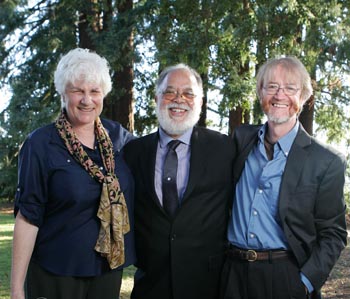More than 100 people filled the Stevenson Fireside Lounge on October 22 to hear Stanford linguistics professor and UCSC alumnus John Rickford discuss his research on the persistent achievement gap between black and white students in reading and the language arts.
Rickford focused on African American Vernacular English (AAVE) or Ebonics--spoken by many African American students--and the negative responses of teachers and school administrators to this variety of language.
He noted that that the typical response has been to either deny the existence of vernacular black English and hope it disappears, ignore it, or vigorously correct it in order to stamp it out and replace it with mainstream or standard English.
"Teachers are usually amazed to discover that African American Vernacular English is systematic and rule-governed like all natural speech varieties," said Rickford. "This has been established by numerous scientific studies. "
He went on to argue that African American Vernacular English should be treated as an asset rather than a burden, and instead used by teachers to help students transition to standard English as they learn to read and write.
Born in Guyana, Rickford had never heard of Santa Cruz or even visited the United States until "a wise U.S. scholarship committee in the 1960s recommended a new branch of the University of California."
He came to UCSC in 1968 on a Fulbright undergraduate scholarship and ended up designing his own major in sociolinguistics. Rickford graduated from UCSC in 1971 with highest honors and went on to earn his Ph.D. in linguistics from the University of Pennsylvania.
"Stevenson College was a wonderful place for me, and I really loved it here at UCSC," Rickford noted. "UCSC gave me the freedom to design my own major and the opportunity to learn how to use linguistics to solve real problems in education."
Rickford has spent more than 40 years studying varieties of English spoken by poor and marginalized communities--examining how they are structured, how they evolve, and what role they should have in the classroom. He is the author of several books, including The Spoken Soul: The Story of Black English, which received an American Book Award in 2000.
Rickford gave examples of many of the techniques linguists are using to narrow the black/white achievement gap in schools-some of which have created public misunderstandings such as the Ebonics controversy in Oakland schools during 1996-97.
He cited promising strategies such as improving teachers and parents' negative attitudes and expectations about vernacular English, contrasting vernacular and standard English so students can better understand and move fluently between them, and using materials written in vernacular English as an initial means of developing literacy skills to help students learn standard English.
"The California Department of Education is currently embarking on a revolutionary effort-turning to linguists and asking them to help students who are having trouble with the transition from vernacular to standard English," Rickford observed. "2009 will see a new set of texts directed at African American students," he added.
The lecture was organized jointly by the Department of Linguistics and by Stevenson College, with some funding support from the UCSC Alumni Association's Distinguished Visiting Professor program, which was designed to enrich undergraduate education at UCSC. The endowment provides financial support enabling the colleges--on a rotating basis--to bring people of academic distinction to campus.



